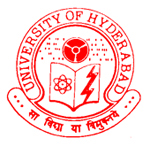Dr. Suresh KoduruUniversity of Hyderabad School of Medical Sciences Hyderabad – 500 046 India |
|
|
| Email: | skmd@uohyd.ernet.in sureshk256@gmail.com |
|
Glycosylation is a post-translational modification during which a carbohydrate is enzymatically linked to a peptide backbone. This addition has numerous effects, inducing increasing protein stability and half-life, and promoting appropriate conformational folding. The importance of carbohydrate modification for the immune response is increasingly recognized. For example, chitosans and glycans, which exhibit pro-inflammatory and proliferative activities. We would like to use in vivo animal models to test the efficacy of biologically active analogues either by attracting/inhibiting immune cells in inflammatory reactions, there by identifying the potential therapeutic target molecules for inflammatory diseases.
Our group is also interested in the screening of glycolipd analogues for their selectivity in inducing Th1 or Th2 responses. Further we want to evaluate the mechanism to better understand the specificity. We are interested in investigating the immune cell (T cells) membrane curvature, deformation and binding strength to integrin molecules. Recently we showed in a gene knockout mouse model, where the Th1 polarized cells failed to migrate to inflamed tissues, due to impaired binding into the VCAM-1 and ICAM-1 under constant flow conditions.
Areas of expertise:
* In vivo animal models for tumor and inflammatory disorders (IBD, colitis, cutaneous inflammatory model) to screen the efficacy of glycol.
* In vivo gene modifications (KO/KI/Transgenic) and animal model development for human diseases.
* Generation of Th1/Th2 T cells in vitro as well as in vivo.
* Immunomodulation technology.
* Generation of specific monoclonal antibodies for proteoglycans/glycolipids and etc.,
* RNA silencing approaches
* Evaluation of immune cell profile by FACS, qPCR and RT PCR approaches.
* Generation of glycolipd specific effector cells.
* IHC, IF, FACS, TEM (Trans Endothelial Migration) and flow assays.
* Lysosomal enzymes and their receptors




